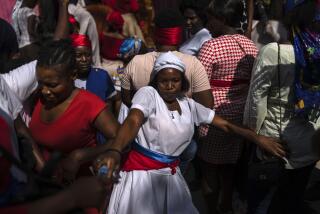Police Curb Port-au-Prince Looters : Mobs Seek Revenge Against Duvalier Militia, Associates
PORT-AU-PRINCE, Haiti — Looters tried Thursday tried to ransack properties held by suspected associates of Duvalier, but soldiers sent to patrol the downtown commercial district intercepted the crowds before they could break into any stores.
In the hills surrounding Port-au-Prince, occasional gunshots were heard. In some cases, neighborhoods previously untouched by such activity became the scene of taunting mobs seeking revenge against members of the Tontons Macoutes, or bogeymen, Duvalier’s personal militia.
Although it was the second consecutive day of scattered unrest in the capital, most of the city functioned normally. Several stores closed in a four-block district downtown, but even there street vendors carried on as usual on crowded sidewalks.
The outbreaks suggest, however, that the lingering presence of Duvalier agents and associates is much resented. In addition, attacks on less well-known businessmen linked to Duvalier may foreshadow wider turbulence, foreign observers said.
To justify their actions, looters on Thursday pointedly used the Creole word dechoukage, which means uproot. Uproot was the battle cry of street demonstrators whose protests helped drive Duvalier into exile, ending 28 years of rule by him and his late father, Francois (Papa Doc) Duvalier.
Since then, pressure has built for the removal of Duvalier cronies still in government and for the prosecution of officials in and out of power who are suspected of human rights violations.
“We don’t want the same people running things. We don’t want the same people in charge,” said Hypolite Bisuit, a basket vendor at a downtown market.
In recent days, student protesters have called for the ouster of Alix Cineas, a member of the National Council, because of his long ties to the Duvalier dynasty.
They have also demanded the removal of Col. Prosper Avril, a close associate of Duvalier who is listed as an adviser to the council.
The National Council is dominated by former Dubavier officials. Only human rights activist Gerard Gourgue, the justice minister, is considered completely untainted.
So far, there has been no general outcry for the other members of the council to step down.
Some employees of private firms and government ministries have initiated their own demands for the firing of Duvalier-linked officials.
Workers at three banks refused to go to work Thursday to protest the continued presence of Duvalier associates among the banks’ directors. In the past, workers in the Agricultural Ministry and in the country’s largest sugar refinery have demanded the ouster of old-time managers connected to the previous government.
In response to the turbulence, the government has called repeatedly for order and sent soldiers to break up sudden gatherings of anti-Duvalier mobs.
To stem criticism that it is soft on Duvalier henchmen, the government has promised to stop officials suspected of human rights abuses from leaving the country. It also pledged to prosecute them if charges are brought.
The measures have not been enough to calm citizens who are nervous about a restoration in all but name of the Duvalier regime.
Meanwhile, in Washington, Secretary of State George P. Shultz, citing significant progress on human rights by the new Haitian leadership, has released $26 million in U.S. aid suspended in the last weeks of Duvalier’s regime.
Several factors this week contributed to the unease in Haiti. First the government permitted the former police chief of Port-au Prince, Col. Albert Pierre, to flee into exile. Pierre was linked with an army unit known for torture and disappearances.
On Thursday, in the first government explanation of Pierre’s exit, an official communique said he was let go in order to ease pressure on the Brazilian Embassy here, where he took refuge.
A report that a secret policeman from the era of Francois Duvalier was trying to leave Haiti on an Air France flight sparked a demonstration at the airport. A mob blocked the runway and threatened violence if he boarded.
The secret policeman, Luc Desir, along with another reputed torturer, Elois Maitre, were arrested by the government, which promised to prosecute them.
It was Maitre’s grain and cooking oil warehouse that was a main target of looting attempts on Thursday. Police welded the metal doors shut before pillagers could enter. A nearby store owned by Haitians of middle eastern descent was also stormed, but protesters did not get inside. Passers-by claimed that the owners were friends of Duvalier.
Finally a report that former Tontons Macoutes had poisoned the water supply in Port-de-Paix, a northern town, sent a fresh wave of indignation through the capital.
Police in Port-de-Paix said that no one died from drinking the water, although 30 sought treatment for stomach pains.
After the poisoned water scare, two former Tontons Macoutes were reportedly assassinated in the streets of Port-de-Paix.
More to Read
Sign up for Essential California
The most important California stories and recommendations in your inbox every morning.
You may occasionally receive promotional content from the Los Angeles Times.









